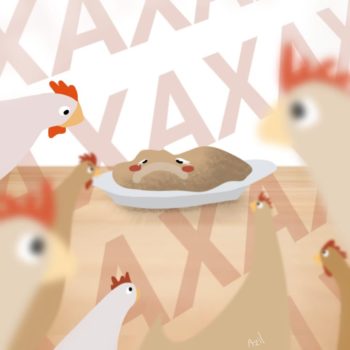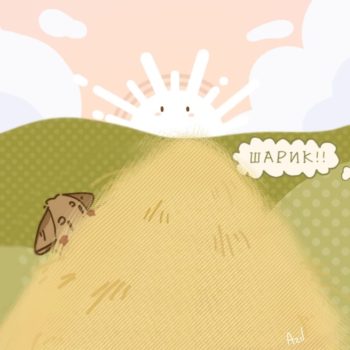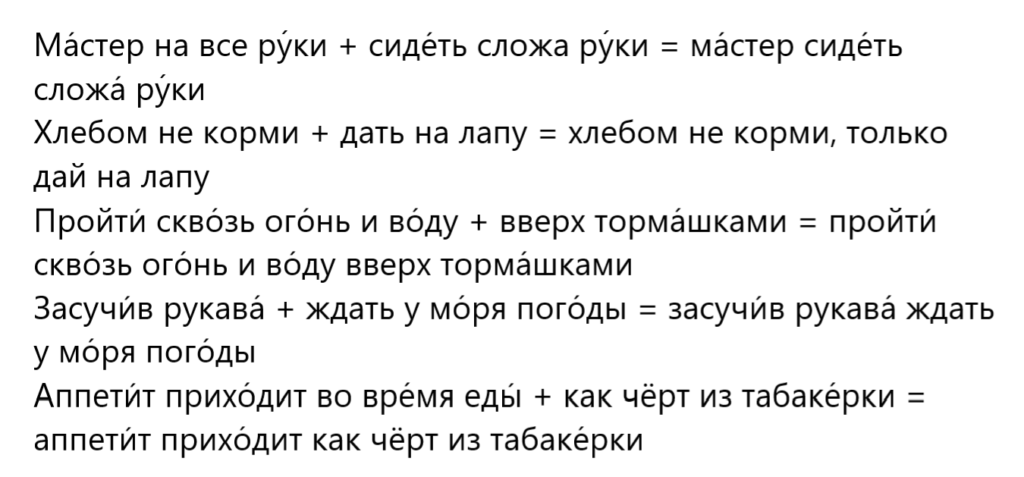Russian malaphors? Posted by bota on Mar 28, 2022 in language
I have recently came across English malaphors – unique and often hilarious mix of idioms, aphorisms, or clichés. The one I saw was “Let’s burn that bridge when we get to it”. It is остроумно1witty, and, as my mom noted, a poster that belongs in a divorce lawyer’s office.
Of course, having chuckled at a few other English examples, I was immediately intrigued: существуют ли «малафоры» в русском языке?2Are there Russian malaphors?
Some google searching revealed helpful articles in Russian that explained what English malaphors were but I could not find a single mention of such a whimsical thing in Russian.
No doubt, there are many questions we have to answer, like “Есть ли место для малафор в русском языке?”3Is there a place for malaphors in Russian?, “What would make them funny and whimsical?”, “Will Russian malaphors follow the same formula as the English malaphors?”, and “And should they be called ‘малафоры’?”.
Но сегодня, не время отвечать на вопросы. Или по крайней мере не на все вопросы. Сегодня — время приключений.4But today is not when we answer these questions. At least not all of them. Today is a time for adventure.
Here are some Russian malaphors I came up with along with a brief explanation of why I think they work or don’t work. *All images in this post are drawn by author’s little sister, Azil.
Trial and error
Я сразу поняла5I quickly realized that just slapping two idioms together with no forethought was not going to work at all.
For example, my first attempt was ironically with the idiom: первый блин комом – a superstitious yet cheerful saying that your first attempt at anything will not be successful. It literally means “the first pancake is a lumpy one”. Here is what I came up with:
Первый блин комом + в двух шагах = первый блин в двух шагах.
Первый блин комом + для галочки = первый блин для галочки.
Первый блин комом + курам на смех = первый блин курам на смех.
This last one is the only funny one because it has the perfect substitution of the endings, since «комом» и «курам на смех» похожи по смыслу6have a similar meaning. It also made a better fit than the other two because the malaphor was funny visually – блин получился настолько плохой что даже куры смеются над ним, вместо того что бы его кушать!7the pancake is so terrible that even the chickens are laughing at it instead of eating it If you flip this malaphor on its head and give it the opposite effect it could have been something like первый блин был как по маслу (первый блин комом + как по маслу). Now it means “the first pancake is going like it’s sliding on butter” or in other words, “this pancake was made with no problems”. Оказывается не так то это просто, придумывать малафоры!8Turns out making up malaphors is quite tricky! But we learned something in the process – malaphors work better if they are ‘visually’ funny.
Bridging the gap
So, I went even further and used the aforementioned “burn the bridge” malaphor as a base for my new experimenting. One of the things that made that malaphor work was having a common denominator: ‘burn bridges’ + ‘cross that bridge’ when we get to it. Here, it was (both literally and figuratively) “a bridge” that allowed for a smooth transition between the two idioms. Speaking of bridges, любителям кино очень понравиться последний блог Райана.
It was harder to find a good common denominator than I originally anticipated, but I came up with these two:
Искать иголку в стоге сена + собака на сене = искать собаку в стоге сена
Тёртый калач + калачом не заманишь = тёртым калачом не заманишь
While the first one makes a cute image of someone looking for their dog, it is neither witty nor useful. The second one makes more sense as a malaphor since тёртый калач is a person who is not easily gullible and saying калачом не заманишь mean that you can’t convince someone to do something even with bribes. So, what can we learn from these two examples?
The key ingredient
In conclusion, it is the juxtaposition of the idioms that creates the comedic effect in most of the malaphors.
Here are my top five made-up malaphors that elicited some laughs or at least a nod of approval from my Russian-speaking friends, students, and family. A moment of appreciation for one of my students who made some great suggestions to the malaphors below.
I would greatly appreciate your feedback on these in the comments below. What do you think of making up Russian malaphors? Have you heard of any malaphors in Russian or in your language? Would you like to make up some malaphors too?
- 1witty
- 2Are there Russian malaphors?
- 3Is there a place for malaphors in Russian?
- 4But today is not when we answer these questions. At least not all of them. Today is a time for adventure.
- 5I quickly realized
- 6have a similar meaning
- 7the pancake is so terrible that even the chickens are laughing at it instead of eating it
- 8Turns out making up malaphors is quite tricky!

Build vocabulary, practice pronunciation, and more with Transparent Language Online. Available anytime, anywhere, on any device.






